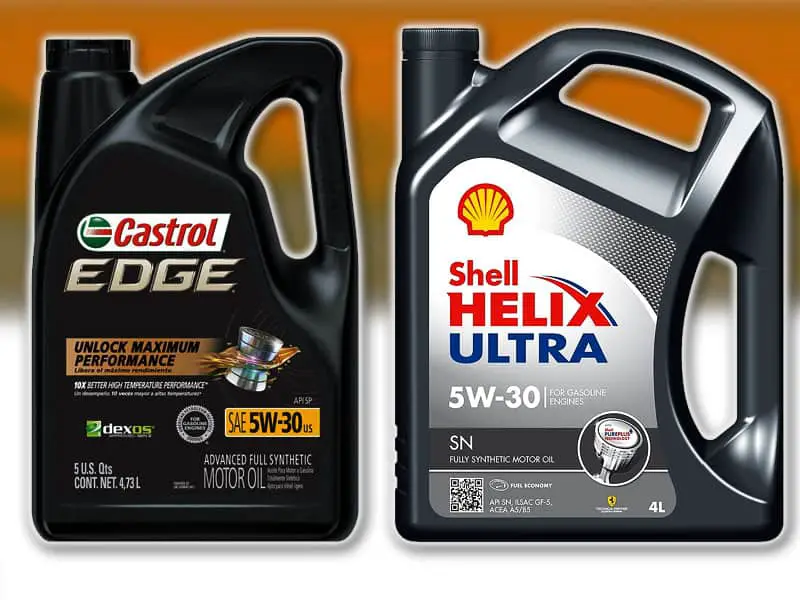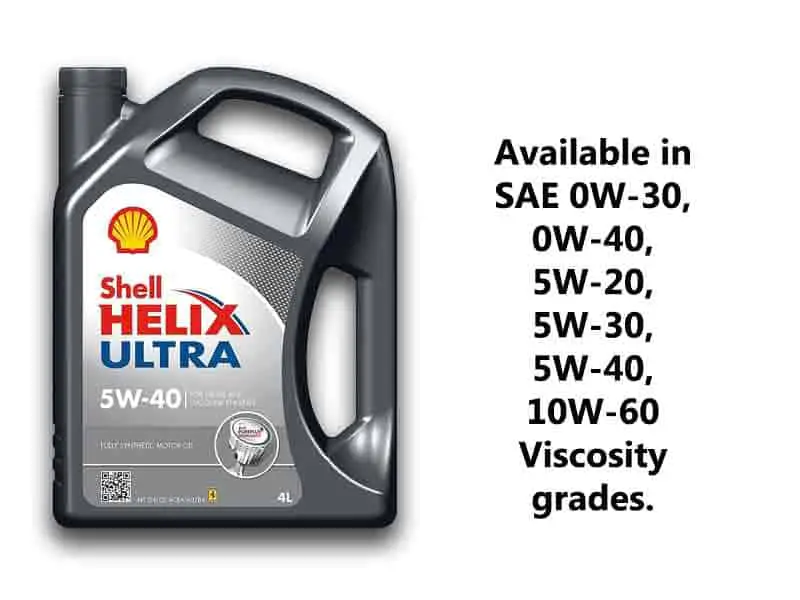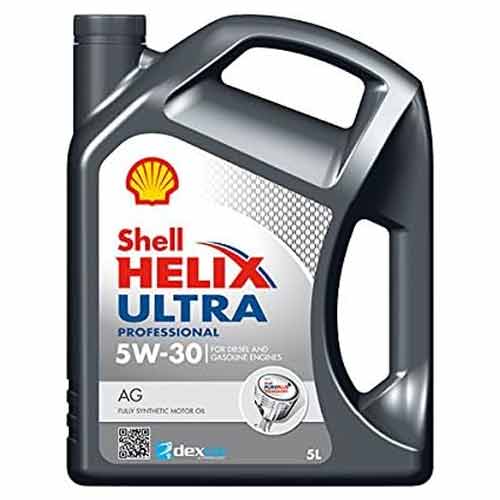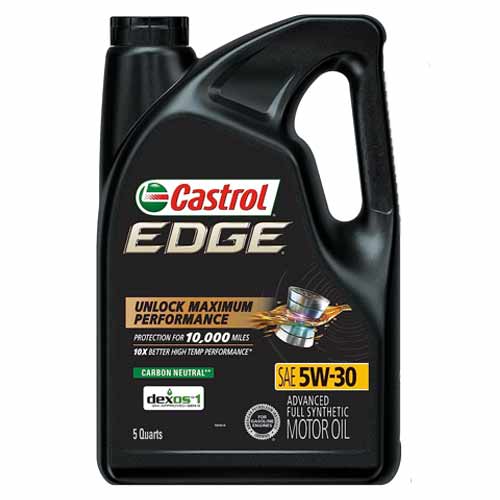Both of the engine oils are fully synthetic with Shell being made from natural gas, as its base stock, instead of crude oil. While Castrol is made from crude oil and advanced additives.
Both of them are formulated for gasoline and diesel engines but Shell is also compatible with engines using natural gas and biodiesel as their fuel.

Both of them meet the API SN and ILSAC GF-5 standards which means they would provide better fuel economy, sludge control, and emission control system compatibility.
Shell Helix Ultra is specially designed for high-performance engines in extreme weather conditions. It provides unparalleled drain interval and flow characteristics in cold weather.
It provides maximum protection in hot climate conditions as well. It is approved and recommended by many famous automobile brands such as Ferrari, BMW, Porsche, etc.
Compare Shell Helix Ultra with others:

Castrol Edge is specifically made for those drivers who seek maximum sludge protection, wear protection, and boosted performance for their latest engines. Its TITANUM FST (Fluid Strength Technology) boosts its performance by preventing oil breakdown in extreme pressure conditions.
Table of Contents
Shell Helix Ultra Vs Castrol Edge


| Specifications | Shell Helix Ultra | Castrol Edge |
| Oil Type | Full Synthetic | Full Synthetic |
| Engine Type | Gasoline / Diesel / Natural Gas | Gasoline / Diesel |
| Available viscosity grades | SAE 0W – 20, 0W- 30, 0W- 40, SAE 5W – 20, SAE 5W – 40, 5W- 30, | SAE 0W – 16, SAE 0W – 20, SAE 5W – 20, SAE 5W – 30, SAE 5W – 40, SAE 5W – 50, SAE 10W – 30, SAE 10W – 40 |
| ILSAC | GF-5 | GF-5 |
| API | SN | SN |
| Cost of 5W – 40 | 28.97$, 4 liters | 39.68$, 4 liters |
| Oil change interval | 11,000 Km | 8,000 Km |
| Additives | Anti-wear agents, cleaning detergents, Antioxidants pour point depressant | Anti-wear agents, cleaning detergents, Extreme pressure additives |
| ACEA | A3/B4 | A3/B4 |
Oil Burn-Off Protection
Engine oil tends to burn off in extreme temperature conditions, depending upon its volatility and flashpoint. Volatility is the tendency of engine oil to evaporate under certain conditions. And flashpoint is the minimum temperature at which engine oil’s vapors mix with air to form a flammable mixture that would flash or ignite in the presence of an ignition source.
Flashpoint of Castrol is comparatively much lower than its competitor and hence would burn off quickly. So for high-temperature conditions, Shell would be the best choice.
| Parameter | Shell Helix Ultra 5W – 40 | Castrol Edge 5W – 40 |
| Flash Point | 242 o C | 208 o C |
Minimizing Engine Wear-Off
Anti-wear additives form a layer between engine moving components to prevent metal-to-metal contact and hence provide wear protection. Zinc, boron, molybdenum, and phosphorous are commonly added anti-wear additives. Their concentration in the engine oil would determine its capability of preventing wear in an engine.
By the tested result given below, we can state that the concentration of anti-wear additives in Castrol is slightly higher than Shell, making it a superior and more favorable choice in terms of wear protection. Even though Shell lacks behind in this regard, its wear protection ability is pretty good and the concentration difference is not that high between the contenders.
| Additive | Content in Shell Helix Ultra 5W – 40 (ppm) | Content in Castrol Edge 5W – 40 (ppm) |
| Zinc | 850 | 990 |
| Phosphorous | 800 | 896 |
| Boron | 209 | 77 |
| Molybdenum | 73 | 1 |
Catalytic Converter Performance
When a small amount of engine oil leaks into the combustion chamber, due to worn seals or piston rings, or when it is exposed to high-temperature conditions for an extended period, zinc and phosphorus ash come into existence.
Zinc and phosphorous are two of the important anti-wear additives in engine oils to provide wear protection. Through the passage of the exhaust pipe, the formed ash settles down on a catalytic converter and lessens its effectiveness.
The concentration of the ash depends upon the initial concentration of zinc and phosphorous in the engine oil.
By analyzing the tested results given below, we can state that Castrol would harm a catalytic converter more than its competitor since it contains a high proportion of zinc and phosphorous in it. In this regard, Shell would be the safest option.
| Engine Oil | Concentration of Zinc (ppm) | Concentration of Phosphorous (ppm) |
| Shell Helix Ultra 5W – 40 | 850 | 800 |
| Castrol Edge 5W – 40 | 990 | 896 |
Reduction of Sludge Build
Base oil in any engine oil breaks down when exposed to high-temperature conditions for a long term and then it combines with the dirt, moisture, contamination, and coolant to produce sludge and deposit. The sludge affects the flow of engine oil and hence could become the cause of the engine’s demise. Cleaning detergents such as magnesium, sodium, and calcium are being added into engine oils to reduce or remove the sludge. Their concentration is directly related to the cleansing ability of the cleaning detergents.
Castrol contains comparatively a very high amount of calcium in it than its competitor and gets the superiority in this regard. Hence, the more favorable option would be Castrol when it comes to cleaning deposits and sludge.
| Additive | Content in Shell Helix Ultra 5W – 40 (ppm) | Content in Castrol Edge 5W – 40 (ppm) |
| Magnesium | 978 | 32 |
| Sodium | 5 | 3 |
| Calcium | 1266 | 2390 |
Viscosity Comparison
The viscosity could be defined as the resistance of a liquid to flow, and if we divide it by the density of the liquid at a certain temperature then it would be known as kinematic viscosity.
The characteristics shown below illustrate that the kinematic viscosity of Castrol is more than Shell. What it means is that it would take more power to make Castrol flow in an engine than Shell, which affects its fuel economy.
Due to the temperature change, the kinematic viscosity of Castrol would be more affected since its viscosity index is slightly lower than its competitor.
Viscosity index is a unitless ratio that measures the effect of temperature change on the viscosity of any liquid. The lower the viscosity index the higher would be the change.
In cold weather conditions, the engine oil becomes denser and more viscous and at one point, it loses its ability to flow. That certain temperature when it loses its flowing characteristic is known as the pour point.
The pour point of Shell is lower than its competitor meaning that it would lose its flowing characteristic later than Castrol. That’s why Shell is the best choice in cold weather conditions.
| Parameter | Shell Helix Ultra 5W – 40 | Castrol Edge 5W – 40 |
| Kinematic Viscosity at 40o C | 79.10cSt | 84 |
| Kinematic Viscosity at 100o C | 13.1 | 13.6 |
| Viscosity Index | 168 | 166 |
| Pour Point | -45o C | -39 |
Oil Change Frequency Comparison
The formation of many acids occurs inside an engine due to side reactions of combustion, oxidation of lubricant oil. To neutralize these harmful acids, alkaline-based additives are being added to the engine oils.
These additives battle against the acids to keep the pH level of engine oil around 7 to 8 (neutral). After their neutralizing ability runs out, the oil becomes acidic and needs to be drained.
The neutralizing ability of these additives can be measured by their Total Base Number (TBN). Shell has more TBN than Castrol meaning that it would neutralize acids for a longer period than its competitor. Hence the oil change frequency of Shell would be lower than Castrol.
| Parameter | Shell Helix Ultra 5W – 40 | Castrol Edge 5W – 40 |
| Total Base Number | 9.3 mg KOH/g | 7.9 mg KOH/g |
Cost Comparison
The cost of 4 liters of Castrol Edge 5W – 40 Fully Synthetic Engine Oil is 39.68$. And the cost of 4 liters of Shell Helix Ultra 5W – 40 Fully Synthetic Engine Oil is 28.97$. Castrol is more expensive than Shell due to its premium sludge and wear protection.
Summary
- Both of the engine oils are fully synthetic and designed for gasoline and diesel engines with Shell being compatible with natural gas engines as well.
- Castrol would affect catalytic converter’s performance more than its competitor.
- Castrol provides better wear and sludge protection than its competitor.
- Shell provides ultimate protection in extreme climate conditions.
- Oil change frequency of Shell is lower than Castrol.
- Effects of temperature change on the viscosity of Shell are comparatively lower than its competitor.
- Castrol is costlier than Shell.